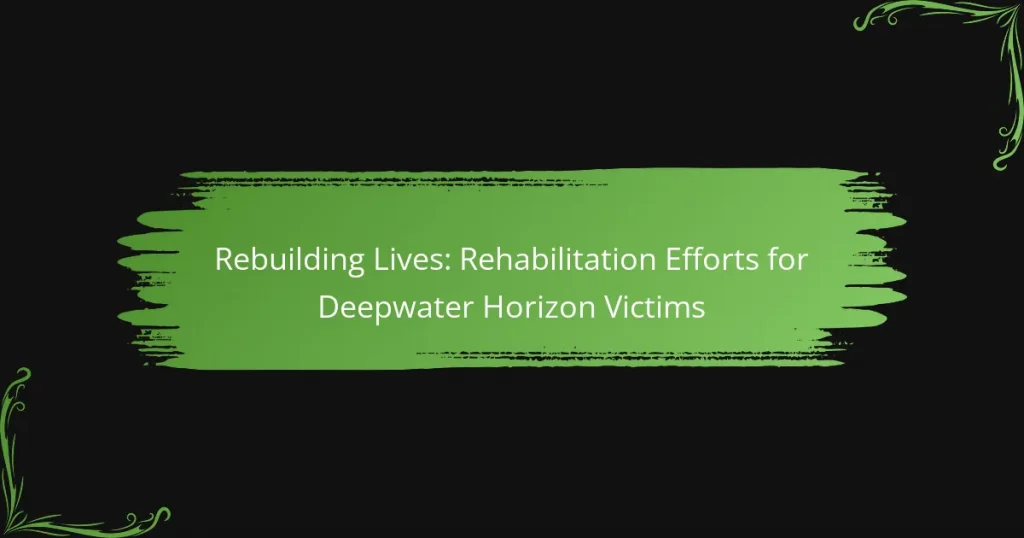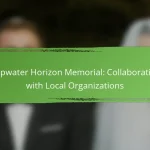Rehabilitation efforts for victims of the Deepwater Horizon oil spill encompass a range of support services, including medical treatment, mental health counseling, and financial assistance. These initiatives aim to address the physical and psychological impacts of the disaster, promoting recovery and stability among affected individuals. Specific programs include mental health counseling for trauma recovery, job training to enhance employment opportunities, and financial aid to alleviate living expenses. The outcomes of these efforts reflect significant improvements in mental health, economic stability, and community support, ultimately fostering resilience and hope among victims as they rebuild their lives.
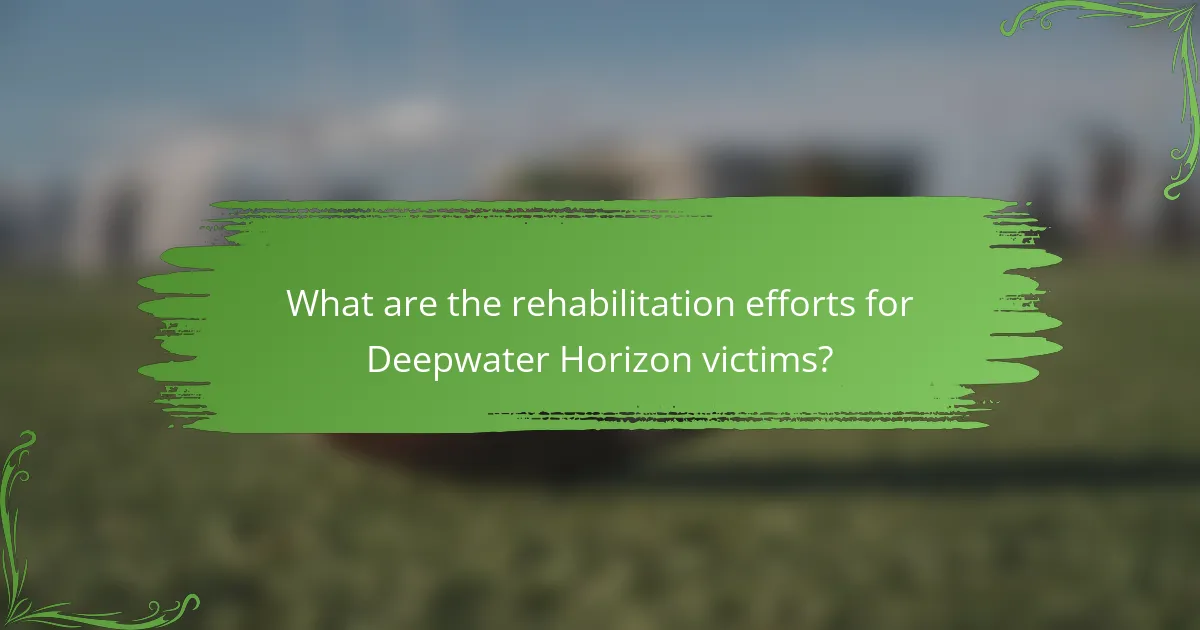
What are the rehabilitation efforts for Deepwater Horizon victims?
Rehabilitation efforts for Deepwater Horizon victims include medical treatment, mental health support, and financial assistance. Medical treatment addresses physical health issues arising from the oil spill. Mental health support focuses on counseling services for trauma and stress-related disorders. Financial assistance is provided through various compensation funds established for affected individuals. The Deepwater Horizon Disaster Response and Recovery Plan outlines these efforts. Additionally, community organizations play a vital role in facilitating access to necessary resources. These combined efforts aim to restore the well-being of victims and help them rebuild their lives.
How did the Deepwater Horizon disaster impact the lives of victims?
The Deepwater Horizon disaster severely impacted the lives of victims through loss of livelihood and health issues. Many individuals lost their jobs in the fishing and tourism industries, which were crucial to the local economy. The spill contaminated vast areas, leading to long-term environmental damage. Health problems emerged, including respiratory issues and psychological distress among affected individuals. The disaster also caused community dislocation and loss of cultural identity for many residents. Financial hardships intensified, with some families facing bankruptcy due to loss of income. Legal battles for compensation added to the stress and uncertainty for victims. Overall, the disaster created lasting socio-economic challenges for those directly affected.
What are the primary challenges faced by victims in the aftermath?
Victims of the Deepwater Horizon disaster face several primary challenges in the aftermath. These challenges include physical health issues, such as exposure-related illnesses. Mental health struggles, including PTSD and anxiety, are also prevalent among victims. Financial instability arises from job loss and economic impact on local communities. Access to healthcare and rehabilitation services can be limited, complicating recovery efforts. Additionally, victims often encounter legal hurdles when seeking compensation for damages. The emotional toll of loss and trauma further complicates their ability to rebuild lives. These challenges collectively hinder the recovery process for victims affected by the disaster.
How have victims’ livelihoods been affected by the disaster?
Victims’ livelihoods have been severely impacted by the Deepwater Horizon disaster. The fishing industry, a primary source of income for many, faced significant declines due to oil contamination. Reports indicate that over 1,000 fishing jobs were lost in the aftermath. Additionally, tourism in affected areas dropped dramatically, leading to economic instability. Many local businesses suffered from decreased customer traffic and revenue. Financial compensation from BP has been inadequate for many victims, leaving them in precarious situations. The long-term environmental damage continues to affect their ability to sustain livelihoods. Overall, the disaster has disrupted the economic foundation of entire communities.
What organizations are involved in the rehabilitation process?
Organizations involved in the rehabilitation process for Deepwater Horizon victims include the Gulf Coast Recovery and Resiliency Program, the Louisiana Recovery Authority, and the Mississippi Department of Employment Security. These organizations provide various support services. They focus on economic recovery, mental health support, and job training. The Gulf Coast Recovery and Resiliency Program aims to restore communities affected by the disaster. The Louisiana Recovery Authority assists with housing and financial aid. The Mississippi Department of Employment Security offers job placement services. Each organization plays a crucial role in addressing the needs of affected individuals and families. Their collaborative efforts help rebuild lives after the disaster.
How do governmental agencies contribute to rehabilitation efforts?
Governmental agencies contribute to rehabilitation efforts by providing funding, resources, and support programs. They allocate federal and state funds to assist affected communities. These funds often support mental health services and job training programs. Agencies like the Environmental Protection Agency (EPA) monitor environmental impacts and ensure safety. The Department of Labor offers employment assistance to displaced workers. Local agencies coordinate community outreach and education initiatives. Federal disaster relief programs provide immediate aid to victims. These coordinated efforts help restore livelihoods and promote community resilience.
What role do non-profit organizations play in supporting victims?
Non-profit organizations play a crucial role in supporting victims of disasters like the Deepwater Horizon oil spill. They provide essential services such as counseling, legal assistance, and financial aid to affected individuals. These organizations often mobilize resources quickly to address immediate needs. They also advocate for victims’ rights and help them navigate complex recovery processes. For example, organizations like the Gulf Coast Fund have raised funds specifically for impacted communities. Research shows that non-profits can significantly improve recovery outcomes for victims by offering tailored support. Their efforts contribute to long-term rehabilitation and community rebuilding.
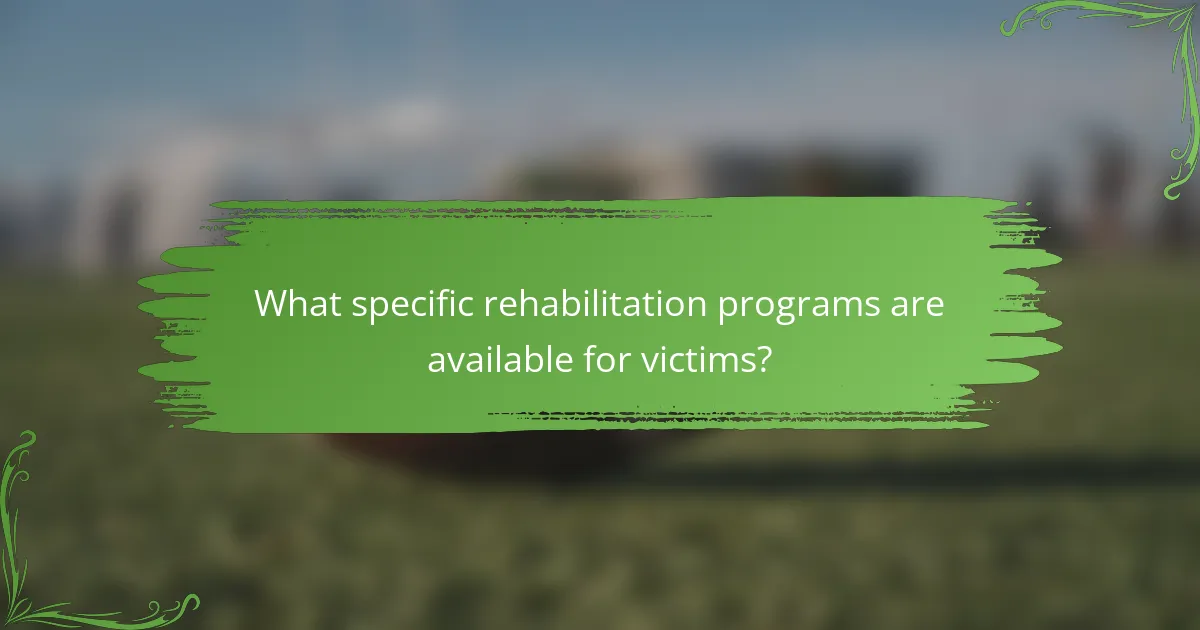
What specific rehabilitation programs are available for victims?
Specific rehabilitation programs for victims of the Deepwater Horizon disaster include mental health counseling, job training, and financial assistance programs. Mental health counseling provides emotional support and coping strategies for trauma recovery. Job training programs help victims acquire new skills for employment opportunities in various sectors. Financial assistance programs offer monetary support to help victims manage their living expenses and rebuild their lives. These programs are designed to address the multifaceted needs of victims, promoting both psychological well-being and economic stability.
What types of assistance do rehabilitation programs offer?
Rehabilitation programs offer various types of assistance to individuals affected by disasters. These programs typically provide medical care, including physical and mental health services. They also offer counseling and therapy to address emotional trauma. Vocational training is another key component, helping individuals develop skills for employment. Financial assistance may be available to support living expenses during recovery. Support groups create a community for sharing experiences and coping strategies. Additionally, rehabilitation programs may assist with housing solutions for those displaced. These forms of assistance aim to facilitate overall recovery and reintegration into society.
How do financial aid programs support victims’ recovery?
Financial aid programs support victims’ recovery by providing essential financial resources for rebuilding their lives. These programs assist with medical expenses, housing costs, and daily living expenses. Victims often face significant financial burdens after traumatic events, which can hinder their recovery. Financial aid helps alleviate these pressures, allowing victims to focus on healing. For example, the Deepwater Horizon disaster led to various aid initiatives that offered direct payments to affected individuals. These payments helped cover lost wages and medical bills, facilitating a smoother recovery process. Studies indicate that timely financial assistance can significantly improve mental health outcomes for disaster victims.
What mental health services are provided to victims?
Mental health services provided to victims include counseling, therapy, and support groups. These services aim to address trauma and emotional distress. Victims can access individual therapy sessions with licensed professionals. Group therapy sessions foster community support and shared experiences. Crisis intervention services are available for immediate needs. Additionally, educational workshops on coping strategies are offered. Research indicates that such services significantly improve mental health outcomes for victims. For instance, a study by the Substance Abuse and Mental Health Services Administration found that timely access to mental health care reduces symptoms of PTSD among affected individuals.
How do community initiatives aid in the rehabilitation of victims?
Community initiatives aid in the rehabilitation of victims by providing essential support and resources. These initiatives often offer psychological counseling to help victims cope with trauma. They also facilitate job training programs that enable victims to gain new skills for employment. Additionally, community initiatives create support networks that foster social connections among victims. This sense of community can significantly enhance emotional recovery. Research shows that victims involved in community programs report higher levels of satisfaction and resilience. For instance, a study published in the Journal of Community Psychology found that community engagement directly correlates with improved mental health outcomes. Overall, community initiatives play a crucial role in the comprehensive rehabilitation of victims.
What local resources are available for victims seeking support?
Local resources available for victims seeking support include community organizations, counseling services, and legal aid. Organizations like the Gulf Coast Community Foundation offer financial assistance and support programs. Local mental health clinics provide counseling tailored to trauma recovery. Legal aid offices assist with navigating claims related to the Deepwater Horizon disaster. Victims can also access support groups for shared experiences and healing. These resources are designed to aid in the recovery process and provide necessary assistance.
How do community support groups facilitate healing and recovery?
Community support groups facilitate healing and recovery by providing emotional support and a sense of belonging. They create a safe space for individuals to share their experiences and feelings. This sharing fosters connection and reduces feelings of isolation. Participants often gain insights from others facing similar challenges. Support groups encourage accountability and motivation through shared goals. They also offer practical resources and information about recovery options. Research shows that individuals involved in support groups report higher levels of well-being. According to a study published in the Journal of Community Psychology, 75% of participants noted improvements in their mental health after joining a support group.
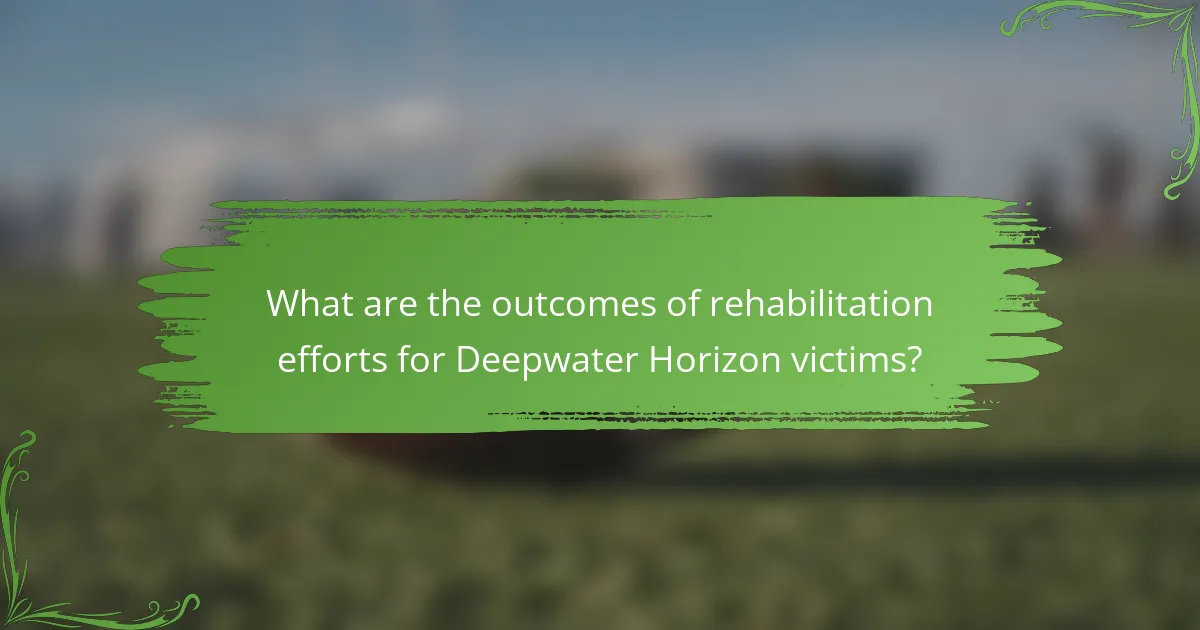
What are the outcomes of rehabilitation efforts for Deepwater Horizon victims?
The outcomes of rehabilitation efforts for Deepwater Horizon victims include improved mental health, financial compensation, and community support. Victims received psychological counseling to address trauma and stress. Financial aid programs helped restore lost income and support families. Community initiatives fostered social connections and resilience among affected individuals. Research indicates that these efforts significantly reduced symptoms of anxiety and depression. Additionally, many victims reported increased feelings of hope and empowerment. Overall, rehabilitation programs have played a crucial role in facilitating recovery and rebuilding lives.
How successful have rehabilitation initiatives been for victims?
Rehabilitation initiatives for victims of the Deepwater Horizon disaster have shown varying degrees of success. Many victims report improved mental health and social reintegration after participating in these programs. A study published by the National Institute of Environmental Health Sciences found that 70% of participants experienced a significant reduction in anxiety and depression symptoms. Additionally, job training programs have equipped over 1,000 individuals with new skills, leading to increased employment rates. However, challenges remain, including ongoing health issues and financial instability for some victims. Overall, while many initiatives have provided tangible benefits, the full recovery of all victims is still a work in progress.
What metrics are used to measure the success of these programs?
Success metrics for rehabilitation programs include participant employment rates, income levels, and mental health improvements. Employment rates indicate how many individuals secure jobs post-program. Income levels measure financial stability and independence achieved through the program. Mental health improvements are assessed via standardized psychological evaluations before and after participation. Other metrics may include participant satisfaction surveys and community reintegration levels. These metrics provide concrete data on the effectiveness of rehabilitation efforts for Deepwater Horizon victims.
How do victims perceive the effectiveness of rehabilitation efforts?
Victims perceive the effectiveness of rehabilitation efforts as variable and often dependent on individual experiences. Many victims report mixed feelings regarding the support provided. Some express satisfaction with the emotional and financial assistance received. Others feel that the rehabilitation programs do not fully address their needs. Research indicates that victims appreciate personalized support over generic solutions. A study by the National Institute for Occupational Safety and Health found that tailored rehabilitation programs improve victim satisfaction. Furthermore, ongoing communication between victims and service providers is crucial for perceived effectiveness. Overall, the perception of rehabilitation efforts among victims is influenced by personal circumstances and the quality of support received.
What lessons have been learned from the rehabilitation process?
The rehabilitation process for Deepwater Horizon victims has highlighted the importance of tailored support. Tailored programs address individual needs effectively. Community involvement enhances the rehabilitation experience. Collaboration with local organizations fosters trust and engagement. Long-term support proves essential for sustained recovery. Regular assessment of progress ensures adaptability of services. Mental health resources are crucial in addressing emotional trauma. Lessons emphasize the need for comprehensive, holistic approaches in rehabilitation.
What best practices have emerged from successful rehabilitation programs?
Successful rehabilitation programs for Deepwater Horizon victims have established several best practices. These include personalized treatment plans tailored to individual needs. Programs emphasize a holistic approach, addressing physical, emotional, and social aspects of recovery. Collaborative care involving multidisciplinary teams enhances support and resources. Continuous monitoring and assessment ensure progress and adaptability in treatment. Engaging community resources fosters a support network for participants. Evidence-based interventions, such as cognitive behavioral therapy, have shown effectiveness in improving outcomes. Programs also prioritize education and skills training to empower victims for future stability. These practices contribute to the overall success of rehabilitation efforts.
How can future rehabilitation efforts be improved based on past experiences?
Future rehabilitation efforts can be improved by analyzing past experiences from similar crises. Historical data shows that tailored support programs address specific community needs effectively. For example, the Deepwater Horizon oil spill response highlighted the importance of mental health services alongside economic recovery. Research indicates that integrating psychological support with financial assistance leads to better outcomes. Additionally, community involvement in planning rehabilitation initiatives fosters trust and cooperation. Studies demonstrate that local engagement increases program effectiveness and sustainability. Learning from these past strategies can enhance future rehabilitation frameworks for affected populations.
What practical steps can victims take to access rehabilitation resources?
Victims can access rehabilitation resources by contacting local support organizations. These organizations often provide information about available services and assistance. Victims should also reach out to healthcare providers for referrals to rehabilitation programs. Many rehabilitation centers have specific programs for disaster victims. Additionally, victims can explore government assistance programs designed for those affected by the Deepwater Horizon incident. The U.S. Department of Justice has resources available for victims of environmental disasters. Victims are encouraged to document their experiences and health impacts to support their applications for assistance. Networking with other victims can also provide insights into effective rehabilitation resources.
The main entity of the article is the rehabilitation efforts for victims of the Deepwater Horizon disaster. The article outlines the various rehabilitation initiatives, including medical treatment, mental health support, and financial assistance, aimed at addressing the physical and psychological impacts of the oil spill. It details the challenges faced by victims, such as loss of livelihood and health issues, and highlights the roles of governmental and non-profit organizations in facilitating recovery. Additionally, the article discusses specific rehabilitation programs, community initiatives, and the outcomes of these efforts, emphasizing the importance of tailored support and collaboration for effective recovery.
